1986
Directed by Tony Scott
Written by Jim Cash and Jack Epps Jr.
Top Gun is difficult to approach, maybe because it's so simple that the dumbest motherfucker can get what it's after on a level of pure mystic enjoyment, while someone who fancies themselves more intelligent and cultured—though in practice this often means someone who treats fictional films as literal documentaries of alternate universe people subject to moral or even legal judgment, rather than celluloid fantasies representing metaphorical ideas and yearnings; or simply someone who objects, on principle, to any film that embraces any of the experiential thrills associated with depictions of war—will sit with a scowl on their face for two hours, not getting it, before dismissing it as a just a big, long commercial for the U.S. Navy and/or masculinity. They're not wrong about that—objectively, it might actually be the single most effective recruiting tool ever devised in peacetime, and it may even be the very last film that had genuine real-world social impact. (Likewise, it's a strong injunction to do more push-ups.)
But the smugness of that. It's frequently a political position rather than an aesthetic one, which can be obnoxious, and it's aged poorly even as politics: we discovered earlier this year that one of the finest things a fighter pilot can do really is to remove a Russian MiG from the sky. Those doing the removal are using their own Soviet legacy equipment, but there's little doubt that their fundamental ethos isn't so distinct from that encouraged by Top Gun. I'd be surprised if they weren't in part inspired to pursue their path by Top Gun. Such is the case in the American context, certainly, so that a film castigated for its sexism (not wholly without reason) has still been approvingly cited by female fighter pilots as a touchstone, which might seem ridiculous if the film's detractors were clear-eyed, but they're not, so they frequently don't realize that the male hero is supposed to be a dipshit, sympathetic and appealing but unrefined, both as a person and a pilot ("naval aviator" he tells her, in a scene that understands mansplaining decades before "mansplaining" was a word), until he's literally taken to school by, inter alia, his female mentor. Who fucks him, yes, but it's not a training manual for courtship any more than it is a training manual for air combat.
I can kind of understand why someone in 1986 dismissed it as superficial Navy-sanctioned warmongering, even as it became that year's highest-grossing film. Movies often make tons of money without being good or interesting, and the recent death of New Hollywood and the ongoing Reagan Revolution must've been depressing. If it still feels like one of those cultural inflection points where critics asked themselves if they were out of touch only to say, "no, it's the audiences who are wrong," at least it's comprehensible: dismissing a piece of what looks like action junk in its day is normal. But Top Gun became a true phenomenon. Everyone has seen it. Everyone can quote it. It's one of the most popular movies ever made, and, as 1980s as it undeniably is, that popularity survived the decade of its manufacture. It's been artistically and industrially influential beyond measurement. I mean, it's a free country—one doesn't need to love it. It's not for all temperaments. But you'd think that 36 years would be enough time to have figured out why it's endured, and how and why it works.
If somebody has, I haven't run across it; and maybe they haven't because it's difficult. It's so much part of the cultural backdrop that it rarely gets mentioned, but Top Gun is weird, a bizarre aberration in many ways for an 80s Hollywood production. It's often impressionstic; even with a heroic focus, it's as collectivist as American cinema gets; I'll explain, but it's practically posthuman. This despite even existing only because writers Jim Cash and Jack Epps Jr. wanted to do a rad movie about jets.
You've seen it (everyone has), but let's adhere to format. So: out on the USS Enterprise in the Indian Ocean, we have Pete Mitchell, an F-14 pilot, under the callsign "Maverick" (Tom Cruise, and hereafter "Maverick" because "Pete Mitchell" is absolutely not his name), and his RIO, "Goose" (Anthony Edwards). (A quick aside: for a stupid movie for stupids, it's impressively willing to make you work to interpret the naval jargon. Then again, most of the dialogue in the film is only texture.) Maverick and Goose, along with their wingman "Cougar" (John Stockwell) and his RIO "Merlin" (Tim Robbins), are sent out to intercept some "MiG-28s" of never-clarified origin (played by F-5s of the Navy's adversary squadron). Here they get into a tense standoff, broken by Maverick obtaining radar lock and flipping one enemy the bird while upside down five feet over his canopy, in an early indication that Top Gun will not be tethered too strongly to reality (though I believe this is the only aerial shot in the film that uses compositing), and that it will be iconic.
The USN pilots return, but Cougar suffers a freakout, leaving their captain in the position of having to recommend Maverick and Goose as his ship's contribution to the Fighter Weapons School aka Top Gun, despite not seeming to like or respect them. Our heroes are stoked even if they received the honor by default, and now we're in San Diego, where Maverick is tasked by his better angels: a woman who shoots him down figuratively when he makes a gross pass at her at a bar without realizing she's an outside expert, Charlie Blackwood (Kelly McGillis), and a man who comes off like he would enjoy shooting him down literally if he could, Tom "Iceman" Kazansky (Val Kilmer). Also, in the roles of auxiliary mentors, we have Top Gun's commander "Viper" (Tom Skerritt) and chief instructor "Jester" (Michael Ironside). That's the deal: Maverick is a selfish dick whose talent has outrun his professionalism; his dickishness gets Goose killed in a way that isn't entirely his fault; Maverick suffers a crisis of confidence that his mentor figures challenge, but can't quite crack; nevertheless (and in the screenplay's most egregiously bullshit move), the Top Gun class is deployed to the Enterprise to have another confrontation with the MiGs, whereupon Maverick comes out as a much better wingman and slightly less of a dick.
It is, admittedly, hard to summarize Top Gun without sarcasm, because it's such an audaciously unadorned Hero's Journey, and one downright top-heavy with mentors—just mentors all over the place. (Plus, as a peacetime war movie, it's a Hero's Journey that's abnormally light on actual action—so light that it might surprise you to realize that while it's exhilarating throughout, there's no violence whatsoever until the finale. It's so good at turning "training for action" into "action" that you might never have noticed.) It is, then, primarily an emotional journey—even that's too strong a phrase; it's a vibe, dynamic in its tones but with most scenes being the same scene, narratively-speaking—delivered amidst sequences of the most spectacular aerial photography (and aerial choreography) ever done for a motion picture.
For various reasons, Top Gun's producers, legends Don Simpson and Jerry Bruckheimer, settled on Tony Scott, a former commercial director presently walking off the failure of his only feature film to date, The Hunger, a detached and arty movie about queer vampires, and therefore perhaps the last person that you'd expect to make a macho blockbuster that Bruckheimer breathlessly described to everyone he had to pitch it to as "Star Wars on Earth." But Simpson and Bruckheimer, contra everybody else, had loved The Hunger, and they must've perceived something there that recommended Scott. He had also (this is the spurious part) directed a commercial for Swedish manufacturer Saab featuring one of the company's cars racing one of the company's fighter jets, though as the fighter is aloft for less than three seconds onscreen, it shouldn't have even indicated to them that Scott could oversee aerial photography. At best, he managed to keep his driver from being run over by the Viggen.
Production was something of a mess, but something special arose out of the conflicts between its many stakeholders. These included not just the above-named principals, but retired naval aviator Pete Pettigrew, the film's technical advisor, and the USN itself, which had been prevailed upon to make unprecedented resources available to the production. Pettigrew had pressed for more realism and failed at pretty much every turn; but he did figure out how to split the difference between realism and movie-magic in his airborne sequences by fitting air combat maneuvers into stretches of sky small enough that the aircraft and their aerobatics would be comprehensible, even in a Panavision frame.
The USN's notes were treated with significantly more gravity, because they had to be; fortunately, Pettigrew cunningly devised a death for Goose that satisfied everyone and didn't make naval pilots look like bigger assholes than the film already portrays. It's down to the USN that Charlie isn't an officer herself (she ran afoul of their non-fraternization policies), and it's also thanks to the USN that the writers were obliged to push their adversary nation into complete anonymity—though at least this allowed Scott to indulge his initial impulse to use the pilots' real-life identity-annihilating oxygen masks and mirrored visors with the bad guys, even if his producers had balked at letting him do this to their stars. (Which points, astonishingly, to an even more stylistically aggressive Top Gun that Scott wanted to make. It might also be why the flight helmets all have their owners' names on them in big block letters, though like much else here, this contributes to its profoundly immediate readability—but then, compared to superhero movies, it's simply gratifying how much Cruise and company keep their fucking masks on.)
But on balance this benefits Top Gun: the adversaries are an abstraction of "an enemy" the same way the entire film is like a dream of flying, except it's a dream of flying conjured through the immense and overwhelming tangibility of real jet fighters really moving through the air, shepherded by Scott and his editors into sequences that somehow feel elegant and disorienting simultaneously, big air combat "furballs" that, for all the repeated footage and continuity errors that crop up, gives you the tactile illusion of being these badass pilots bringing order to chaos. It's fantasy with physicality: the entire film can almost be summed up, and not solely because it's my favorite production anecdote ever, with Scott's story about running out of time and taking resort to writing a check to the Enterprise's captain for the Navy, so he could turn an entire aircraft carrier around, just to get a few more shots in the right light.
Maybe, then, there was nobody more perfect for this job than Tony Scott. It's fun to imagine a world where The Hunger was successful, but I'm glad Scott took the path he did—even as his most evocative stylistics abated in the face of more literal-minded movies, there was never anybody quite like him, though they tried. The Hunger had strongly resembled his brother Ridley's early work, but Top Gun itself is an unheralded example of the Scott brothers' 80s form, too—it's the same visionary, dreamlike totalism. Scott called Top Gun "rock and roll," and, yeah, that'll do: music is terrifically important here, to the extent of being a narrative structural element (this includes Harold Faltermeyer's score, but Top Gun has one killer soundtrack, a pioneer in using pop songs as not just anchors for scenes, but as replacements for dialogue and plot). It's less an ad for the Navy than a music video about it.
For all The Hunger's differences, there's a tantalizing throughline, both films being about bottomless desire born of a certain inarticulable emptiness; in The Hunger this is pathological, but in Top Gun it's sentimental and inspirational, and necessary for Maverick's growth, not just as a killer but as a person. (The screenwriters conceived Top Gun, fundamentally, not as a war movie but a sports movie, and this comes through, though it's more keenly felt for its life-and-death stakes.) It is about seeking perfection, yet curiously gentle about that: the very first thing that we see Maverick do (well, second thing, after the bird) is help Cougar, and Cougar is never berated or belittled for failing to measure up to their superhuman standard. Maverick is berated—it's what mentors in movies do, and Maverick has, like, four—but as loud as it is, it's always critique rather than cruelty, even when it's pitched in the form of aggression from a competitor and the film's "villain," Iceman, whom the writers have expressly stated should be considered the better pilot. (I've barely mentioned Cruise, though this is what turned him from star to supernova. Let's simply say he's very good at listening to criticism in interesting ways, implying interior struggles for a character who has the bare minimum interiority.) It is, anyway, "about" something grand enough it apparently doesn't count, a ceaseless striving at the edge of human possibility. This is where Scott comes in, a commercial director directing like a commercial director who'd once considered becoming a documentarian. He basically achieved that on Top Gun, which, in all essentials, is a documentary on the subject of staging awesome stunt flying with F-14s, A-4s, and F-5s, and, occasionally, blowing up enormous 3:1 scale models of them.
But it was Scott the commercial director who took a screenplay that is already incredibly, cartoonishly blunt ("the maverick is named Maverick?" observation does get tired), and by instinct and training he renders this world in the form of the objects that occupy it—the hardware, the product—and with incredibly little distinction between his human objects and every other kind, from the F-14s to Maverick's motorcycle to those flashy Ray-Ban aviator sunglasses. This is somewhat obligatory: Maverick has to be his F-14, or it's just footage of planes and Tom Cruise cut together. But Top Gun goes well beyond that, Scott imposing upon the film its actual resonance, that these technologies need to be flawless extensions of the humans who operate them, true mergers of man of machine without, in the process, destroying the man. The prologue tells you how you to watch it, underlining how much Top Gun is indebted to its music, beginning with Faltermeyer's immortal "Top Gun Anthem," one of the 80s' most wondrous pieces of film music, a melancholy but resolutely soaring thing, that indeed feels like the anthem a man would write about glorious machines. For a brief spell Top Gun is contemplative, damn-near meditative, as arcane procedures are performed and silhouetted figures service aircraft rendered otherworldly in the smoke and haze and sunset, culminating with the afterburners on an F-14, so that somehow the movie gets even oranger; then it hard cuts, almost like a joke, into Kenny Loggins's equally-immortal "Danger Zone," which comes awfully close to being the anthem a machine would write about men.
The men already are machines, a fleshy element emphasized by Jeffrey Kimball's sweaty daylight neo-noir photography, but beautiful technology all the same, objectified as much as the planes they fly, getting downright Theban about it—by which I mean "Top Gun is famously gay," most obviously but not solely in that much-beloved volleyball scene. (2800 words before "Top Gun is gay," surely a world record.) It's frustrating to see people still think this was on accident—Scott patterned his masculine aesthetic explicitly on Bruce Weber photography; Kilmer's tinge of sexual challenge certainly wasn't discouraged—and, frankly, it's rude. Top Gun's reception by the gay community in the 1980s was something that Scott was extraordinarily proud of. It's a reminder how vital an erotic, objectifying gaze is to cinema, and that it was a mistake to abandon it. It's more by accident that Top Gun's ever straight: Charlie exists less because Maverick needs a woman than a feminine outsider to be vulnerable in front of, though I don't begrudge it this; Scott's smart about it, using colors he barely uses here otherwise, particularly in the blue Expressionist porno sex scene, but elsewhere, and more subtly, greens—and while I can't break it down logically, there's something fascinating about this, the way sleek, professional Charlie becomes a symbol of the technological prowess Maverick requires (Maverick's arousal is piqued by Charlie running him down angrily and recklessly across San Diego in a car chase), and the sex indicates some new, mysterious synthesis between Maverick and metal. I don't know, when David Cronenberg does it, you think it's genius, but Tony Scott actually made me want to fuck metal.
And this is burying the lede, but it is such a sexy movie: the planes are sexy; the dudes are sexy; the sex is sexy; I don't know why people don't admit McGillis is a sexy woman except they want to make Top Gun even gayer than it is; the sunsets are sexy. So many sunsets, and if I have one real problem it's Scott overusing orange filters to the point of comedy. Even this excess is forgivable, since for every one dumbass shot unpersuasively slathered half in orange smog, there's another where it feels like watching weapons emerge from some mythological forge, waiting for the day humans would unite with them in the primordial flames of creation. Whatever else it is, Top Gun is definitely a film about its own sense of coolness, written and edited as if they took military pilots' "comms economy" as a guiding principle, in aphorisms and bytes and hits of dopamine and adrenaline. It flows but strangley, and barely seems like "a story" if you intellectualize it, which is a mistake. Even if you have no use for it, it's hard to imagine a much more perfect version of what it strives to be.
Score: 10/10

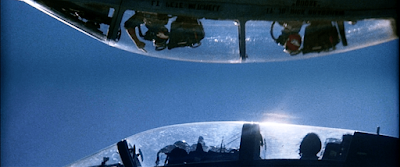
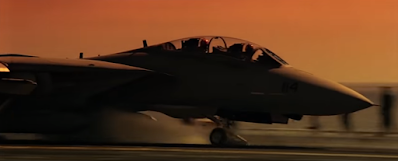
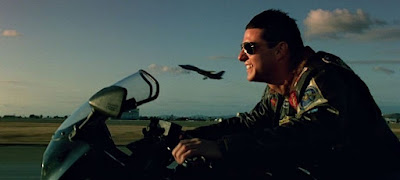
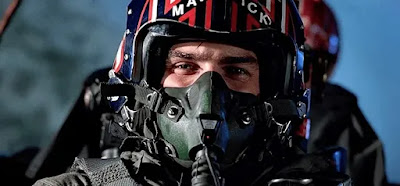

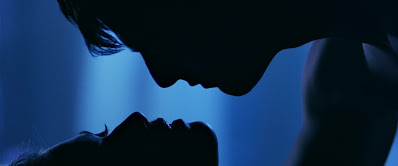
I just caught this one for the first time with the intent of seeing TGM in theaters before it leaves. I found myself surprised this is remembered as a mediocrity (at least based on the critics I've sampled). I think it's pretty terrific for reasons you highlight. It's one of the horniest blockbusters I've seen in a long time.
ReplyDeleteYeah, I think it's "about sex" in getting at other things, but it's 100% about sex as an end in itself.
DeleteI would like to wholeheartedly agree with this review … and I absolutely, wholeheartedly do, it’s spot-on (Especially about the lovely Ms. McGillis: hopefully Maverick and Charlie were able to stay friends after).
ReplyDeleteOne would also like to share my theory for why TOP GUN has joined the Immortals of cinema - it is a cheesy movie in the same way that Mr Dino De Laurentis was a producer of cheesy B-movies.
Which is to say that both these institutions are not only cheesy, they are The Big Cheese: they are the cheese serious, self-important food critics of wondrous snobbery produce an embarrassment of tongue-baths when writing or declaiming their opinions of same.
Except the Mirror Universe version of that (In the same way that Alex Luthor is a superhero in DCs answer to the Mirror Universe), where lesser mortals and not the 1% actually enjoy the thing in question.
I initially read "the cheese [that] serious" as The Cheese Serious, which I'll tell you, I enjoy very much as a phrase.
DeleteBruckheimer and Simpson apparently knew how (potentially Bruckheimer still does) to produce crowd-pleasers, anyway, though other than the equal and alike Days of Thunder, I'm not sure they've got a better one.